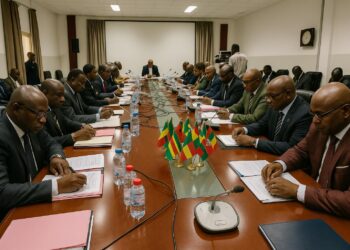Oil-Price Volatility and the Rebalancing of Public Finances
In the aftermath of successive oil-price contractions that shaved several points off Congo-Brazzaville’s GDP, fiscal strategists in Brazzaville have turned their attention to non-hydrocarbon revenue streams. The Kouilou customs corridor, controlling the bulk of imports and exports through Pointe-Noire, has accordingly become pivotal for budgetary consolidation. World Bank data indicate that customs and excise duties could account for nearly a quarter of the country’s domestic revenue if leakages were stemmed, a projection that underscores the strategic calculus behind the latest ministerial intervention (World Bank governance indicators 2023).
A Candid Diagnosis by the New Finance Steward
During a recent inspection of border facilities, Finance Minister Christian Yoka departed from traditional protocol, openly acknowledging what he termed an “unsustainable culture of impunity”. Six months into his tenure, Yoka’s public reprimand of local officials signaled a policy shift from discreet administrative memoranda to visible political ownership. Observers close to the cabinet suggest that the minister’s rhetorical firmness is designed to reinforce an agenda of credibility that international lenders, notably the IMF, have long advised as a pre-condition for concessional financing (IMF 2023 country report).
Customs at the Intersection of Governance and Development
Corruption at border posts reverberates far beyond the immediate loss of tariff revenues. Economists at the Economic Commission for Africa estimate that informal payments can inflate logistics costs by up to 30 percent, thereby hampering regional competitiveness. Congo’s small and medium-sized enterprises, especially agrifood exporters seeking to diversify away from hydrocarbons, remain disproportionately affected. By curbing rent-seeking behaviour among customs agents, policymakers hope to shorten clearance times, improve the World Bank’s Doing Business indicators and amplify the attractiveness of the Pointe-Noire Special Economic Zone, a flagship project backed by the African Development Bank (AfDB industrialization briefing 2024).
From Presidential Mandate to Administrative Enforcement
President Denis Sassou Nguesso has repeatedly framed the fight against ‘antivaleurs’ as a matter of national security and social cohesion. His 2018 state-of-the-nation address announced that no rank would be immune from scrutiny, a narrative reinforced by the operationalisation of the Haute Cour de Justice. Within this institutional environment, Minister Yoka’s warning that ‘têtes tomberont’ if malpractice persists is more than rhetoric; it translates a presidential doctrine into sector-specific compliance protocols. The October 2024 suspension of six senior customs officers, following internal audits, is viewed in diplomatic circles as an early test case for the nascent accountability architecture.
Tools of Enforcement: Digitalisation and Peer Verification
Technocratic solutions are being layered onto political resolve. The Treasury has accelerated deployment of an electronic single-window platform expected to cut face-to-face interactions between traders and officials. Parallel plans for biometric identification of customs staff aim to eradicate phantom postings that have historically inflated payrolls. According to a senior official in the Directorate-General of Customs, the ministry is also negotiating a memorandum with regional neighbours to enable cross-border verification of shipping manifests, thereby closing avenues for invoice under-declaration. Donor agencies have welcomed the approach, pointing to Ghana’s and Rwanda’s digital customs successes as replicable precedents in Central Africa (UNECA good-practice note 2022).
Diplomatic and Economic Ripples of a High-Profile Clean-Up
Foreign missions in Brazzaville privately concede that steady progress in customs governance would bolster Congo’s eligibility for renewed debt relief negotiations. Paris Club creditors attach particular weight to demonstrated domestic resource mobilisation when assessing restructuring requests. Meanwhile, regional partners within CEMAC, keen to harmonise tariff regimes, see Brazzaville’s initiative as a timely contribution to collective stability. Should Minister Yoka succeed, the Kouilou blueprint could become an exportable model, enabling the Republic of Congo to reposition itself as a norm-setter rather than an outlier in the Central African anti-corruption landscape.
Prospects for Sustained Momentum
Sceptics caution that past anti-graft drives faltered once immediate political pressure subsided. Yet three variables differentiate the current episode: the explicit endorsement from the presidency, the convergence of donor conditionalities, and the deployment of verifiable digital tools. Although the path remains arduous, each incremental gain in transparency translates into tangible fiscal breathing-space at a moment when global hydrocarbons markets remain volatile. For a government intent on financing social programmes without resorting to unsustainable borrowing, ministerial vigilance in Kouilou may thus hold macroeconomic significance far exceeding the confines of the port.












































